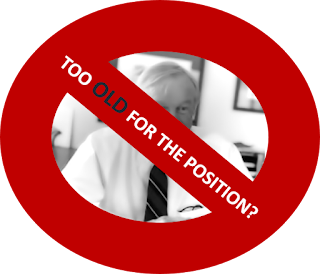Confront Ageism With Confidence and Strategy!
The problem of Ageism
"I went to the interview and thought it went well, but still didn't get the position. Was it my age?"
“I feel that I will have to settle for less money and lower position because no company wants to hire an older leader.”
“Maybe I should just give up looking for my ideal position, they won’t hire me anyway.”
“I noticed the surprised looks when I walked through the door. I can tell they expected someone younger; like everyone else in the room.”
 |
| The interview went well. What happened? |
Many workers over 40 are having difficulty getting hired to their next position because they believe they are victims of ageism or age discrimination. Many 40+ workers have shared stories on social media of having great interviews, meeting all of the requirements of the position to later not hear back from the organization after several weeks. With their confidence now compromised, these workers feel humiliated, marginalized and rejected.
Is it all in their head?
A simple internet search will provide plenty of articles on ageism. Ageism is not only a problem in America but around the world. A recent study1 by Abrams, Swift, and Drury in the Journal of Social Issues actually reveals that there is implicit bias when people are presented with the choice between younger and older candidates. Almost 80% of the participants in each of three studies selected the younger candidate; despite the fact that all candidates shared equal experience. The study abstract cites the following:
“These studies reveal that: (1) positive older age stereotype characteristics are viewed less favorably as criteria for job hire, (2) even when the job role is low-status, a younger stereotype profile tends to be preferred, and (3) an older stereotype profile is only considered hirable when the role is explicitly cast as subordinate to that of a candidate with a younger age profile. Implications for age-positive selection procedures and ways to reduce the impact of implicit age biases are discussed.”
Common ageism stereotypes conclude that older workers:
§ Are inefficient, can’t keep up with the latest technological developments.
§ Are difficult to work with and resent younger leaders.
§ Are inflexible and less open to change.
§ Have mental and physical deterioration that make older workers ineffective.
§ Can't make good decisions about important issues.
Age stereotypes can originate from the way older workers are portrayed on television or in movies and is implied by the concentrated focus on attracting “fresh” millennial workers. The truth is that the stereotypes do not accurately reflect the flexibility and experience of mature workers3.
Since ageism exists, what can older workers do to get the position?
Take control of your career! Build a strategy to overcome ageism.
Mature workers can change the conversation by being themselves. In fact, mature workers have knowledge, experience and demonstrated flexibility (they had to in order to progress) as assets to become irresistible to companies.
- Be confident! Do not allow anyone to marginalize you.
- Embrace your maturity. You’ve earned it. The skills you have been able to master and the lessons learned over time establishes you as a subject matter expert (SME) and makes you invaluable to a company.
- Obliterate the stereotypes! Be aware of the most common stereotypes and challenge them through your words, actions and demonstrated results.
- Leverage your unique experience. Use storytelling to vividly illustrate those key experiences that match or surpass position requirements.
- Research the company and Industry. Solve a pressing problem. Use examples from your career that demonstrate you have mastered the issue.
- Engage in continuous learning. Knowledge and technology is constantly changing. Demonstrate your ability to be flexible by staying informed of industry trends, core issues, and latest technology. Take a free online course on a topic that you are unfamiliar with but appropriate for your position.
- Update your resume. Refresh your resume with updated designs, format and content.
- Upgrade your search. Engage in an active search that puts you in the driver seat. Rather than simply apply to online positions, leverage your network. Let them know you are searching for the right opportunity. Build contacts with target companies send a note of introduction and inquire about open positions that match your skills and experience.
- During the interview, ask pointed questions regarding the future of the company and how your experience can help the company achieve its goals. Post interview, always send a follow-up letter. Send a second follow-up letter even if you don’t get the position. Keep you on their mind.
- Have a strong online presence. Embrace social media, share your knowledge on LinkedIn and BeBee through writing articles and sharing posts. Keep up with the latest technology.
- Sharpen your expertise and get paid for gigs. Join the “gig” community by offering your expertise on sites like fiverr.com and remote.com.
By 2025, the workforce will consist of four generations; baby boomers, generation x, millennials and generation z. The need for experienced leaders with the ability to manage across diverse teams is increasing3. Mature workers could be ideal for these future positions. The key is to maintain a positive attitude, take a proactive approach and stay encouraged.
If you experience age discrimination, keep a record, detail and report it. If the company has a process, go through the internal process first. The following resource2 can help determine what can be done.
Nanette Kirk is the President and CEO of NetKi Enterprises, A resume writing and motivational services company. We are helping our clients reach newer heights in their career. To learn more about us, our resume design templates or online course, Write a Captivating Resume like the professionals! Go to www.netkienterprises.com or be inspired at www.netkient.com. Follow me on LinkedIn and the NetKi Enterprises Company page on LinkedIn.
Resources:
(1) Abrams, D., Swift, H. J. and Drury, L. (2016), Old and Unemployable? How Age-Based Stereotypes Affect Willingness to Hire Job Candidates. Journal of Social Issues, 72: 105–121. doi:10.1111/josi.12158
(2) Your Rights Proving Discrimination. Workplace Fairness It’s everyone’s JobTM Retrieved from http://www.workplacefairness.org/proving-employment-discrimination on April 30, 2017.
(3) Kadlec, D. (2016) The Suddenly Hot Job Market for Workers Over 50. Time.com. Retrieved from http://time.com/money/3725034/jobs-older-workers-improved/ on April 30, 2017.
Scheve, T., Venzon, C. 10 Stereotypes About Aging (That Just Aren’t True). How Stuff Works Health. Retrieved from http://health.howstuffworks.com/wellness/aging/aging-process/5-stereotypes-about-aging.htm on April 30, 2017.







Comments
Post a Comment